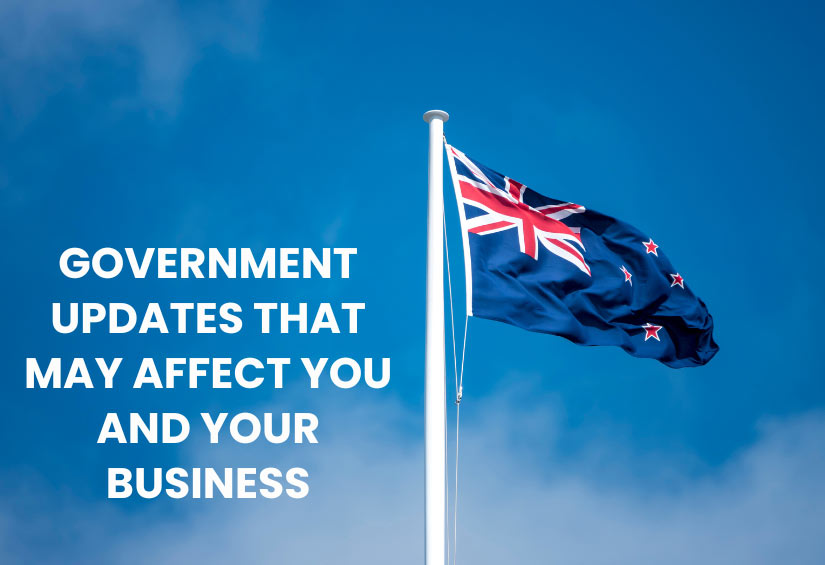Minimum Wage Increases Again
The adult minimum wage will be rising to $23.15 per hour from 1 April 2024. This is an increase of 45 cents per hour from the current hourly rate of $22.70.
The training and starting-out minimum wages will also both increase to $18.52 per hour, remaining at 80% of the adult minimum wage. This is a rise from the current minimum rate of $18.16 per hour.
If you are concerned about how this increase will impact your business, please feel free to contact us on 03 374 9393.

For more info check out this 1 News article:
Five Major Policy Changes
As Prime Minister Christopher Luxon has settled into office, we can expect policy changes to roll out. Here are some of the major changes businesses should watch out for:
1. The reintroduction of 90-day employment trial periods
The National-led government has extended the 90-day employment trial period to include all businesses. This reverses the changes made under the Employment Relations Amendment Act in 2018, which scrapped 90-day trials for businesses with more than 20 employees.
2. Clean car discount and ‘ute tax’ ending
The clean car discount, under which people could claim back up to $8,625 for an electric or hybrid vehicle, has disappeared for all vehicles registered after 31 December 2023. The levy on higher emissions vehicles, such as utes, has also been scrapped.
3. Fair Pay Agreements cancelled
The Government has repealed the Fair Pay Agreements Bill. This was introduced to give workers in certain industries power to negotiate minimum employment terms. Collective agreements can still be negotiated by unions through collective bargaining, however, with the repeal of the Fair Payments Agreements Bill, any person or organisation that obtained personal information for the purpose of Fair Pay Agreement bargaining must now dispose of that information in line with the Privacy Act 2020.
4. Fuel tax changes
National has previously stated that the Auckland fuel tax, which adds 11.5 cents to every litre of petrol sold in the city, is set to go. However, no indication on the timing of this has been released. National also wants to cancel planned fuel tax increases that would have added a further 12 cents to the litre.
5. Rural regulations set to go
National and Act have committed to reducing regulation and red tape in the farming sector. What that looks like we are still to find out. We’ll keep you posted.
Further Tax Changes That Are Expected This Year
Income Tax Threshold Changes
Personal tax changes will be announced in this year’s budget to counteract inflation from 1 July 2024. The $14,000 threshold for the 17.5% rate will move to $15,600, the 30% threshold from $48,000 to $53,500 and the 33% threshold from $70,000 to $78,100. We will keep you updated on what you need to do for this as it happens.
These will flow through to other taxes on individuals, including fringe benefit (FBT), employer superannuation contribution tax (ESCT), resident withholding tax and prescribed investor rates (PIR). The new bands would mean new calculations would need to be made.
Trustee Tax Rate Change
The 39% tax rate will apply to trustees from 1 April 2024. Currently, there are only exemptions for estates and disability trusts. If this changes, we will know late February.
App Tax
The Government looks like they are set to go ahead with an “app tax” From 1 April 2024. This means platforms involved in ride-sharing, food delivery or short-term accommodation will need to charge GST even if the owner or driver earns under $60K / year. The responsibility will be on the platform providers themselves to charge GST. This may mean owners with houses listed on AirBnb will need to increase the price to cover the GST component added by the platform provider.
An “input tax credit” equal to 8.5% of the service charge will be permitted, effectively meaning 6.5% of GST will be added to the service’s value. This credit is meant to be transferred to the original owner/driver by the platform, likely through reducing commission charges. The purpose of this 8.5% credit is to reimburse unregistered owners/drivers for the GST they’ve incurred on their operational expenses.
Fringe Benefit Tax Exemptions
Last year, in 2023, three new Fringe Benefit Tax (FBT) rules kicked in. The exemptions are:
- Employer-subsidised public transport (mainly for the purpose of travelling between home and work).
- The provision of self-powered (bicycles) or low-powered vehicles (such as scooters) for work-home travel.
- Employer contributions toward ‘vehicle-share services’ used for travelling between home and work.
What this means for your business
Employees will need to use these mainly for the purpose of travelling between home and work. Within reason, some private use will be acceptable (eg. Biking to the supermarket). The self or low-powered vehicle must be suitable for commuting to be granted exemption – ie. high-end racing bikes would not be exempt.
What it means for your FBT returns
These exemptions give you the option to offer different remuneration and benefits to your employees. Consider how these benefits can align with your business sustainability and environmental goals, offer bike-to-work schemes, or encourage public transport use. You will need to be mindful of these exemptions when processing your FBT returns.
If you’ve got questions about FBT exemptions, please don’t hesitate to reach out.
What Property Investors Need To Know
- National is expected to reduce the bright-line test for property investors from 10 years to 2 years, returning the law to its 2015 setting from 1 July 2024. New builds will not be exempt from the two-year bright-line.
- Interest deductibility for property investors will also be phased back in, reversing Labour’s ‘phased-out’ ban on interest deductions. The coalition agreement suggested the phases would be 60% in 2023-24, 80% in 2024-25, and 100% in 2025-26, however, the Government press release implied that this would start from 2024 – this is yet to be confirmed.
- As part of the coalition government negotiations, National’s proposed restrictions on foreign persons acquiring residential properties for more than $2m in New Zealand and the proposed 15% ‘foreign buyer tax’ on such purchases have been cancelled. The expected increase in demand for residential property due to this proposed change will no longer occur.
- Tax deductions for depreciation on commercial and industrial (non-residential) buildings will be removed from the 2024-25 income year.
The Reserve Bank Is Looking To Revamp Its Lending Rules
The Reserve Bank is proposing some new rules for retail mortgage lending to bring in the long-expected debt to income ratios (DTI’s). The DTI restrictions will limit how much debt borrowers can take on compared to their income, along side other measures such as the loan to value ratios (LVR’s). The main proposals are as followed:
- The Debt-to-Income Ratio for owner-occupiers would be six times their income, and investors would be seven times their income. Banks would not be able to have more than 20% of new lending above the DTI ratio for owner occupiers and 5% for investors. This effectively means banks may have a little leeway in restrictions of the DTI ratio (your income) for owner occupiers depending on your situation, but not much for investors.
- Banks can slightly ease LVR’s:
- For Owner Occupiers banks would be able to lend 20% of loans to borrowers with a deposit of less than 20% – Currently only 15% of loan deposits can be under 20%.
- For Investors banks would be able to lend 5% of loans to borrowers with a deposit/equity of less than 30% – Currently as an investor you would need a deposit/equity of 35%
Public Holidays For Employees Working Shifts/On Call
Have you recently reviewed that you are paying public holidays correctly? It can be difficult to navigate for both shift and on call staff so we have included a linked button below that will help you determine the correct treatment:
Expect more changes as the year goes on. We’ll keep you up to date on these issues!

